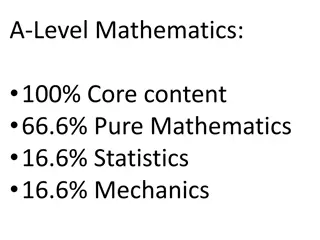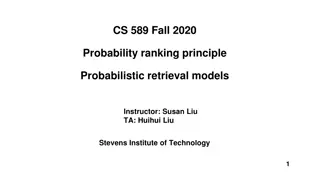Understanding Ordering, Ranking, and Types of Ranking in Mathematics
Explore the concepts of ordering and ranking in mathematics through examples and definitions. Learn about ascending and descending order, as well as different types of ranking such as standard competition ranking, ordinal ranking, and fractional ranking. Gain insights into how mathematical values are arranged and compared in various scenarios.
Download Presentation

Please find below an Image/Link to download the presentation.
The content on the website is provided AS IS for your information and personal use only. It may not be sold, licensed, or shared on other websites without obtaining consent from the author. Download presentation by click this link. If you encounter any issues during the download, it is possible that the publisher has removed the file from their server.
E N D
Presentation Transcript
http://t1.gstatic.com/images?q=tbn:ANd9GcSjebGSlNAF5700Wh4x3OlWoAsLteBEwGABgl29n9SpERuqesEWhttp://t1.gstatic.com/images?q=tbn:ANd9GcSjebGSlNAF5700Wh4x3OlWoAsLteBEwGABgl29n9SpERuqesEW
INTERPRETATION OF TEST SOCRES
TOPIC: ORDERING AND RANKING
ORDERING: Definition:
ASCENDING ORDER: Arranged from lowest to highest: 85, 9O, 95, 100, 110, 115, 125, 130, 135, 140
DESCNENDING ORDER: Arranged from highest to lowest: 140, 135, 130, 125, 115, 110, 100,95, 90, 85
RANKING: Definition:
Definition #2 Ranking: Ranking is the relationship between two mathematical values where each value can be less than, greater than, or equal to the second value.
EXAMPLE: RANK SERIAL NO # SOCRES 1 62 1st 2 53 2nd 3 45 3rd 4 45 3rd 5 39 5th
EXAMPLE: Rank the following scores obtained by 5 students of class 2nd in mathematics test: 45, 62, 39, 53, 45
EXAMPLE: RANK SERIAL NO # SOCRES 1 62 1st 2 53 2nd 3 45 3rd 4 45 3rd 5 39 5th
Types of Ranking: There are three main types of ranking: 1. Standard competition ranking 2. Ordinal ranking 3. Fractional ranking
1. Standard competition ranking: Definition: Standard competition ranking, or SCR, is a ranking system in which the mathematical values that are equal are given equal rank and the next, lesser value is given the next highest rank.
EXAMPLE: Our order is: 62, 53, 45, 45, 39, 34, 29.5, 28.5, 20 . According to this order, the first student scored 62 marks , second student 53 marks, but we have a problem when it comes to third place. There are two same score 45 marks. According to standard competition ranking, the mathematical values that are equal are given equal rank and the next, lesser value is given the next highest rank. Therefore, both students would receive third place, and the student that have 39 marks would receive fifth place. Notice that we skipped fourth place. For this particular ranking system, in this situation, fourth place does not exist because of the third place tie.
2. Ordinal ranking: Definition: Ordinal ranking is a system of ordering where each mathematical value is given a certain position in a sequence of numbers where no positions are equal .
EXAMPLE: Let's move on to ordinal ranking. We already ordered our data, so let's take a look at it one more time: 62, 53, 45, 45, 39, 34, 29.5, 28.5, 20 According to the ordinal ranking system, each mathematical value is given a certain position in a sequence of numbers where no positions are equal. Therefore, the competition officials would have to come up with a way to break the tie, An example of an arbitrary but consistent system would be to incorporate other attributes into the ranking order (such as alphabetical ordering of the competitor's name) to ensure that no two items exactly match.
3.Fractional ranking: Definition: Fractional ranking is a system of ordering in which the mathematical values that are equal are given the mean of the ranking positions.
EXAMPLE: Now for fractional ranking. Once again, let's have a last look at our data: 62, 53, 45, 45, 39, 34, 29.5, 28.5, 20 According to the fractional ranking system, the mathematical values that are equal are given the mean of the ranking positions. Therefore, the competition officials would have to take third and fourth place and find the mean, like this: FORMULA: R=SN1+SN2/NTS 3 + 4 = 7/2 = 3.5
Importance of Ordering and Ranking: Ranking students achievement. Analyzing and evaluating research. Important part of competitions.

























